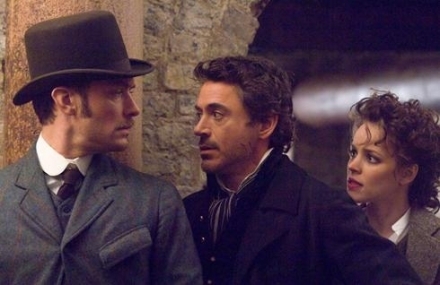Guy Ritchie’s Sherlock Holmes is that rarest of animals—a thoroughly terrible movie that is also thoroughly enjoyable, in part because it embraces it’s own badness with such gleeful aplomb. It knows it’s ridiculous, and like a satisfying Bond movie of the not-taking-ourselves-too-seriously era, it manages to ride that ridiculousness to an amusing if not revelatory conclusion.
Admittedly, I entered the theatre expecting only the worst, thus invoking the magic of lowered expectations. I am a Sherlockian of sorts, more devoted to the original stories than any of the adaptations (Although I thought Mitch Cullin’s A Slight Trick of the Mind was brilliant and heartbreaking), and I will admit to an abiding fondness for the Brett-and-Hardwicke Granada Television productions thereof. This evidence will no doubt reveal that I am, to put it mildly, a traditionalist when it comes to Sherlock Holmes. But this—
Well, it isn’t Holmes. Not even remotely. But the curious thing about it is that in some ways it is Holmes, and perhaps closer in spirit than any of the other movie adaptations I have seen.
Downey’s Holmes is a drunk rather than a cocaine addict, a much more down-at-the-heels and scruffy sort than the Holmes of yore. He is a pugilist not in any gentlemanly fashion (It’s little remembered now, but Conan Doyle’s Holmes was an aficionado of the manly art of fisticuffs, and quite capable of bending fireplace pokers with his bare hands) but the sort of guy who participates in bare-knuckle boxing for fun. His relationship with Jude Law’s Watson is more one of equals than is often presented on film—the point of Watson as Conan Doyle wrote him was never that he was a bumbling idiot, but that he was an accomplished medical man and soldier who was still never quite in Holmes’ league—but Holmes at least did not think him hopeless.
I think is some ways the relationship as presented in this movie is more true to the spirit of the source material than many others: this Holmes and Watson genuinely care for and infuriate one another. They have a passionate, contentious, manipulative friendship that echoes very well the tone of the source material as transposed for modern eyes. And the chemistry between Downey and Law is sufficient to carry what serves as the emotional core of the film—that relationship, and the stresses placed on it by the appearance of Watson’s fiancee (Kelly Reilly, who quite excels the one or two times where she has anything to sink her teeth into, character-wise—she’s absolutely magnificent in the scene in which she pursues a disguised Holmes to confront him regarding his feelings towards Watson) and Holmes’s old flame.
Very few fans will be surprised to know that that second person is the inimitable Irene Adler (Rachel McAdams, who is serviceable in the role but does not really have the strength of presence to believably carry off selling herself as the only person ever to beat Sherlock Holmes at his own game).
Visually this is a quite attractive movie. It’s shot dark, and throughout people’s eyes gleam with dark intentness and the textures of their clothes more than make up for lack of color. There’s a certain amount of semi-nude Robert Downey Jr., frequently while hitting things, and trademark Ritchie games with subjective time.
Oh, and there’s also a plot, of sorts, which is mostly a somewhat ingenious series of justifications on which to hang the fight scenes, some jokes, and an almost romantic tension between Holmes and Watson. (Their bickering old-married-couple portrayal extends to the addition of an English bulldog to the 221b Baker Street household.) Don’t think too hard, and certainly don’t apply logic; this is a comic-book plot, and does not reward close inspection. Fortunately, it moves fast enough that its silliness can largely be ignored.
And it’s gleefully faithful to Conan Doyle in that the science is made up on the spot to fulfill the twin demands of sounding good and supporting the plot. Nothing in here is any sillier than “The Speckled Band.”
The similarities to Bond movies do not end there: there are numerous explosions and unlikely escapes, an unconvincing evil mastermind and his towering bulletproof sidekick, and an overblown round of fisticuffs among the scaffolding on a half-completed Tower Bridge. All good fun. All not very Conan Doyle.
But for a movie that diverges so greatly from the source material, Ritchie has made a film that also relies very heavily on the audience’s existing understanding of Holmes and his personal relationships and intellectual capabilities for its emotional impact. We are expected to know of Holmes’s famous passion for rationality; the film relies on it without ever establishing it. We need to know who Adler and Moriarty are, and Lestrade. We need over all to be invested in Holmes and Watson’s relationship, because that is the engine that drives this whole teetering, unlikely edifice rattling down the tracks to its inevitable round of poetic justices and the sequel hook.
Elizabeth Bear is the Hugo and Sturgeon Award winning author of a bunch of books and short stories, several of which contain a character named after Irene Adler.










